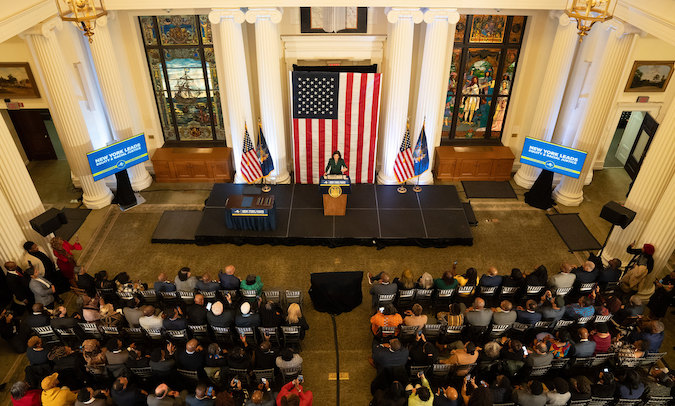NY will have commission study reparations and racial justice
‘We have a moral obligation to reckon with all parts of our shared history as New Yorkers, and this commission marks a critical step forward in these efforts.’ – Gov. Kathy Hochul

Photo from Governor’s Office: Kathy Hochul was in New York City today to sign legislation creating a commission to study reparations and racial justice.
Press Release, Gov. Kathy Hochul’s Office
NEW YORK CITY – Governor Kathy Hochul today signed legislation to continue New York’s leadership on racial equity by creating a new commission to study reparations and racial justice.
This commission acknowledges the horrific injustice of slavery and will be tasked with examining the legacy of slavery, subsequent discrimination against people of African descent, and the impact these forces continue to have in the present day.
“Today, we are continuing our efforts to right the wrongs of the past by acknowledging the painful legacy of slavery in New York,” Governor Hochul said. “We have a moral obligation to reckon with all parts of our shared history as New Yorkers, and this commission marks a critical step forward in these efforts.”
Legislation S.1163-A/A.7691 acknowledges the significant role the institution of slavery played in the establishment and history of New York. The legislation establishes the community commission on reparations remedies, which will be composed of nine members who are especially qualified to serve by virtue of their expertise, education, training, or lived experience in the fields of African or American studies, the criminal legal system, human rights, civil rights, reparations organizations, and other relevant fields.
Prior to the American Revolution, there were more enslaved Africans in New York City than in any other city except Charleston, South Carolina, and the population of enslaved Africans accounted for 20 percent of New York’s population, while 40 percent of colonial New York household owned enslaved Africans. This was an integral part of the development of the State of New York, and the consequences of the institution of slavery – and subsequently, discrimination and systemic racism borne of that institution – can still be observed today.
State Senate Majority Leader Andrea Stewart-Cousins said, “I would like to thank Governor Kathy Hochul for signing this transformative legislation into law and for lending her support in helping New York begin our process of reckoning with the past. I am grateful to Senator James Sanders for championing this cause, standing as a stalwart for positive change. As Senate Majority Leader, I am also proud to have worked diligently to help guide this historic legislation to passage in the State Senate. Together, New York can shape a future marked by justice and equity.”
Speaker of the Assembly Carl E. Heastie said, “Today marks a momentous occasion in New York history. African Americans have been subjected to racial, economic, and institutional injustices that have plagued our communities for decades – a reality we must still acknowledge. Although we have come a long way from the institution of slavery, its remnants can still be felt and require more insightful thought and change.”
The commission is tasked with examining the legacy of slavery and its lingering negative effects on people currently living in the State of New York, with the goal of issuing issue a report comprised of recommendations for appropriate action to address these longstanding inequities. This written report of findings and recommendations must be submitted to the temporary president of the senate, the speaker of the assembly, the minority leaders of the senate and the assembly, and the Governor of the State of New York no later than one year after the date of the first meeting of the commission.
President of the NAACP New York State Conference Dr. Hazel N. Dukes said, “With the establishment of this commission, it will give us the chance to review, and look at the history of African Americans in New York State. And when the report is done, it will give us the necessary tools – where we should go for economic growth, for quality health, equity in education, job training, job creation, housing – and many more things. This is a great day for New York State moving in the right direction of inclusion for all people. Thanks to the Governor and our legislature’s leaders, for taking this tremendous step.”


























































